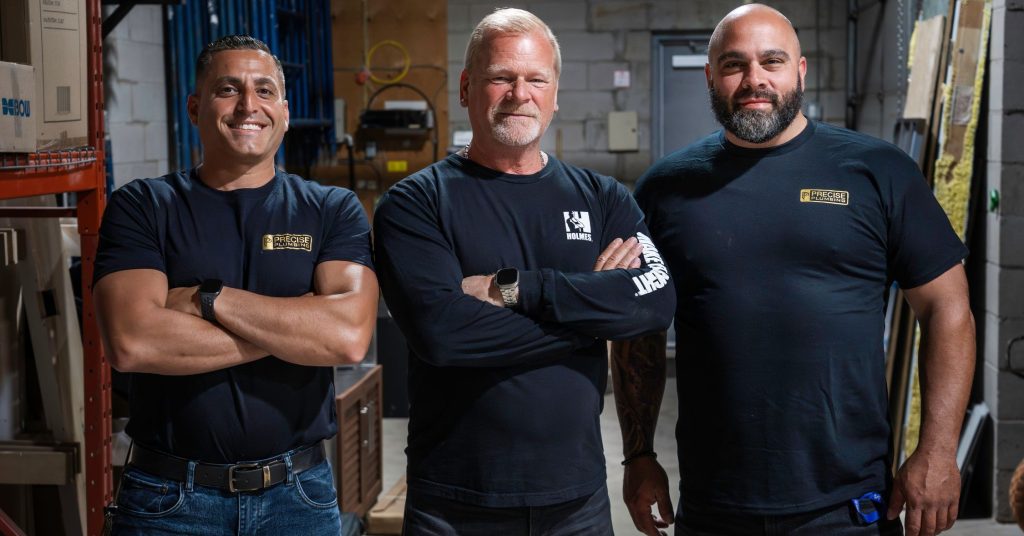I love exploring new technology—especially when it genuinely improves how we work in construction—and I recently came across one that truly impressed me, iGUIDE by Planitar Inc. In my...

Want to Get into the Skilled Trades? Here’s some Advice.
By
Mike’s Advice / Skilled Trades
Monday, May 27th, 2024 @ 12:15pm
Why the Skilled Trades Are Worth Exploring And How To Get Started In The Skilled Trades
I love working in the construction and home renovation industry. Whether you are just starting out, older or looking for a second or third career, there are many opportunities in the skilled trades. As long as I’m doing this, I will continue to be a voice and an advocate for encouraging people to consider a career in the skilled trades.
We’ve all been told that 700,000 skilled tradespeople are set to retire by 2028 and this is going to leave a huge gap in the workforce. The only way we can ever hope to replace these much-needed professionals is by investing in the next generation NOW.
RELATED
The Beginning of Holmes on Homes: My Life as a Renovation Television Personality
Top Resources for Launching Your Skilled Trades Journey
There are tons of ways to explore the many skilled trade career options. Here are some links that can help:
- Skills Canada Programs and Initiatives
- Ontario College Skilled Trade Programs
- Women in Skilled Trades (WIST) General Carpenter Pre-Apprenticeship
- JILL of All Trades (JOAT) A Day for Women
- Women Building Futures
- Careers in Construction
- Skilled Trades College of Canada
- Best Trade Schools of 2024
- St. Lawrence College – Mobile Training Lab
- SkillsUSA
10 Pro Tips for Every Skilled Trades Apprentice
I’ve been in the industry for a long time. Here’s some good advice for anyone looking to get into the skilled trades or just starting out as an apprentice:
Tip #1 – Punctuality
I’m a big stickler for punctuality. I’m always early to any job site or appointment. It shows commitment and reliability. This is an essential skill in life.
Tip #2 – Master the Essential Skills
No matter what career you choose it is essential to have Skills for Success. There are nine skills for success, and they are used in every skilled trade and technology career. Actually they should be applied to any career. They are reading, writing, numeracy, digital, communication, collaboration, problem-solving, adaptability, creativity & innovation.
Skills for success are not only crucial in school but also in the workplace. Many businesses are seeing the benefit of investing in their employees by encouraging them to upgrade their skills. This allows for more opportunities to innovate, adapt to workplace changes to stay competitive, expand and keep their workforce strong.
Tip #3 – Networking Is Crucial
Don’t be shy. Be open to getting to know co-workers and making connections. You never know when these connections may help in opening a new door in the future.
Tip #4 – Every Task Matters
Do every task with dignity. I’m going to be honest. When you are starting out you will get the grunt jobs, but that’s just part of the journey and learning self-discipline. I remember when my son Michael first started helping me on the job site, grumbling because he had to sweep the floors but he soon realized that this is an essential task – not to mention, that a clean work site is a safe work site.
Never think any job is beneath you. A construction site or job site represents a team, and everyone is essential. Be enthusiastic about any task you do and be willing to learn and take on challenges. Being positive will get you noticed, and take you a long way.
Tip #5 – Don’t Be Afraid To Ask Questions
Remember no question is a stupid one. Never be afraid to ask any question. If you don’t want to do it in front of a group – take the person you are working with aside, and ask the question. As an apprentice, or when you are starting out you really need to understand what you are learning. Most good leaders and mentors will be happy to give you advice and guidance.
Tip #6 – Find a Mentor
If you haven’t found a mentor yet, I highly recommend finding one. When apprenticing, this is an ideal time to find one. Mentors have the experience and knowledge and are happy to share it.
Tip #7 – Observe, Learn, and Do It
Watch and listen. Many people in the trades learn by observing and actually doing a task instead of just reading about it. Take the time to listen to your co-workers and supervisors but also observe your surroundings– it is the best way to learn.
Tip #8 – Be Proactive
Be proactive and self-reliant in your learning. Being open to learning new skills should always be on the table.
Tip #9 – Take Notes And Document Everything
Keep a journal of your tasks and accomplishments. Take photos too. As you gain experience some of these tasks can be part of your portfolio. Plus, I like having a journal as a reference, and it helps staying organized. It can also help with evaluations and potential future interviews.
Tip #10 – Invest in Yourself and Your Tools
Invest in your chosen career. Try to have the essential resources, like a laptop, and basic tools to help you succeed. Everything is getting more and more expensive but look for benefits, grants, and awards to help. Plus, most skilled trades jobs are well-paying and you will be able to pay off your tools in no time.
How Parents and Educators Can Help Support The Skilled Trades
Tip #1: Educators and parents must expose their students and kids, including young girls, in the early stages of their education, to the many options within the skilled trades, as viable career options.
Tip #2: It’s not just construction jobs. The skilled trades include information technology, manufacturing, engineering, transportation, and so much more.
Did you know there are over 140 skilled trades available?
Tip #3: We also need to invest more in our schools so that all kids of all ages have the opportunity to be exposed to the skilled trades. In an episode of Holmes Family Effect, we were able to transform three rundown classrooms and help save a skilled trades program at a local Brampton high school —it was amazing!
How Businesses Can Help Support The Skilled Trades
Tip #1: Businesses must invest in the core skills of their workers to ensure that both the company and its employees benefit. It is a win-win situation when we invest in our kids from a young age and expose them to the various opportunities available in the skilled trades.
Tip #2: Employers need to invest in training less experienced workers and provide incentives for young people, new Canadians and people looking for a second career to consider a skilled trade.
Our Holmes Approved builders and product partners, invest in their workforce, hire apprentices, and offer additional training to grow their employees. This includes digital resilience training, behavioural health and psychological safety so they can think, feel and be their best. It pays to invest in your workforce.

We’ve been working with Precise Plumbing for many years now. The expertise and knowledge this team brings to our jobs is amazing, we love working with them and love that they are investing in future generations and building a path for them to join the skilled trades.
There are so many ways to find out if a career in the skilled trades is right for you. Be open to trying new things and think outside the box – you will be so surprised to learn about the many different opportunities available. And if you are having trouble finding resources check out the ones mentioned here and ask your parents and teachers for help. If we all support each other anything is possible.
READ MORE
Behind the Scenes of Holmes Family Effect: One Step at a Time
Behind the Scenes of Holmes Family Effect: Trade of a Lifetime








